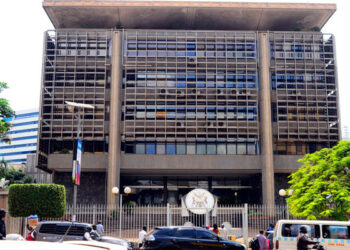In a significant setback for regional economies, trade among East African Community (EAC) states has taken a sharp downturn, plummeting by a staggering $1.8 billion.
The decline has been attributed to the emergence of barriers and taxation hurdles, casting a shadow on the once flourishing intra-regional trade.
According to a recent report on regional commerce, policymakers have been falling short on their promises, as significant policies are agreed upon but implementation is consistently delayed.
This failure to act has led East African Community member states to repeatedly disregard the Common Market Protocol, resulting in the erosion of the regional integration agenda.
The imposition of non-tariff barriers (NTBs) on trade and frequent requests for preferential tax treatment and exemptions have further exacerbated the situation.
The Intra-EAC Trade Brief Analysis report, conducted by the East African Business Council (EABC), reveals a distressing decline in the value of trade among EAC member states.
In 2022, the total trade value witnessed a drastic reduction of more than 33 percent, amounting to a staggering $1.8 billion drop, from $5.4 billion in 2021 to a mere $3.6 billion.
Analysis of the report indicates that intra-EAC trade experienced the most significant impact in two key sectors. Trade in cereals plummeted from $607.2 million to $285.5 million, while trade in mineral fuels fell from $618.2 million to $175.1 million during the same period.
However, the report also highlights a glimmer of hope as intra-export trade in maize saw a noteworthy increase of 63 percent, rising from $114.6 million to $187.1 million.
The decline in trade and the hurdles faced point to a critical need for swift action to address the challenges posed by NTBs and the call for preferential tax treatment.
Strengthening the commitment to implementing agreed-upon policies is essential to revitalize regional commerce and foster the spirit of integration within the East African Community.
Hurdles to trade
The EABC has identified several significant obstacles hindering the growth of regional trade. These challenges include: restrictive trade practices, the incomplete implementation of the revised Common External Tariff (CET), high business costs, over-reliance on foreign currencies, and dependence on rain-fed agriculture.
Additionally, global shocks have had spillover effects, exacerbating food insecurity by disrupting the supply of vital commodities like fuel, fertilizers, and wheat within the region.
In 2022, Kenya made a controversial decision to waive the import duty on edible oil, deviating from the EAC common external tariff rules. The Kenya Association of Manufacturers (KAM) opposed this move, expressing concerns about the impact on the local industry.
Despite implementing the EAC-CET trade regime, which places imported finished goods, including edible oil, under a 35 percent import duty to support local producers, Kenya’s Trade ministry allowed duty-free importation of cooking oil for one year.
The situation escalated when Trade Cabinet Secretary Moses Kuria proposed replacing the 35 percent duty on imported crude oil with a 10 percent export and investment promotion levy.
Kenya also imposed import taxes on various products, including packaging paper, clinker, and metal products, leading to questions from manufacturers in the country.
Rajan Shah, the chairman of KAM voiced his concerns about the imposition of levies on imported raw materials and intermediate products meant to promote exports.
He emphasized the negative impact of these actions on Kenyan consumers, indicating potential price increases for staple foods such as maize flour, due to the rising costs of packaging materials.
The EAC took measures to improve trade dynamics by adopting a new four-band tariff structure that took effect on July 1st, 2022. The primary objectives were to eliminate the frequent use of “Stays of Applications” by partner states and to foster intra-regional trade, attract investments, and create employment opportunities within the region.
However, addressing these challenges and ensuring the effective implementation of these measures remain critical for the growth and sustainability of regional trade in the East African Community.
In the revised tariff structure, import duties have been adjusted to encourage certain trade patterns within the East African Community (EAC). Raw materials and capital goods are now exempt from import duties, while intermediate products that are not available in the EAC region attract a 10 percent levy.
On the other hand, intermediate products that are available within the region are subject to a 25 percent duty, and imported finished products are subjected to a 35 percent import levy.
According to the EAC Secretariat, the implementation of a 35 percent duty on finished products holds the potential to boost intra-EAC trade by $18.9 million, create 6,781 jobs, and increase the region’s tax revenues by 5.5 percent.
To promote regional integration and bolster intra-EAC trade, the EABC has organized a forum scheduled to take place in Kampala from August 31st to September 1st. The forum aims to garner support for the removal of trade barriers and the facilitation of investments within the region.
For instance, Kenya has imposed restrictions on the import of Ugandan milk, which is more affordable due to lower production costs. This action has prompted President Yoweri Museveni’s administration to explore alternative markets in North and West Africa.
Similarly, South Sudan has recently banned the import of maize from Uganda, while Tanzania has temporarily suspended the issuance of permits to Ugandan traders.
These developments highlight the complexities and challenges in regional trade, emphasizing the need for continuous efforts to address trade barriers and foster a more seamless and integrated trade environment within the East African Community.
Preferential Tax Treatments
Regarding preferential tax treatment, almost all member states of the East African Community (EAC) aim to secure tax advantages in order to safeguard their respective industries.
For example, Tanzania has requested a postponement in implementing the regional Common External Tariff (CET) rate of 50 percent.
During this period, Dar-Es-Salaam will continue to impose a duty rate of 35 percent for one year on vitenge fabric, while Uganda will similarly delay zero-rating and apply a duty rate of 10 percent for one year on mobile phones.
Conversely, Kenya will suspend the application of the EAC CET rate of zero percent and instead apply a duty rate of 25 percent for one year on mobile phones.
Uganda, in addition, has sought to designate ‘ginger’ as a sensitive item for one year and intends to suspend the application of the EAC CET rate of 35 percent, applying a duty rate of 60 percent for the same period.
Do you have a story in your community or an opinion to share with us: Email us at editorial@watchdoguganda.com













